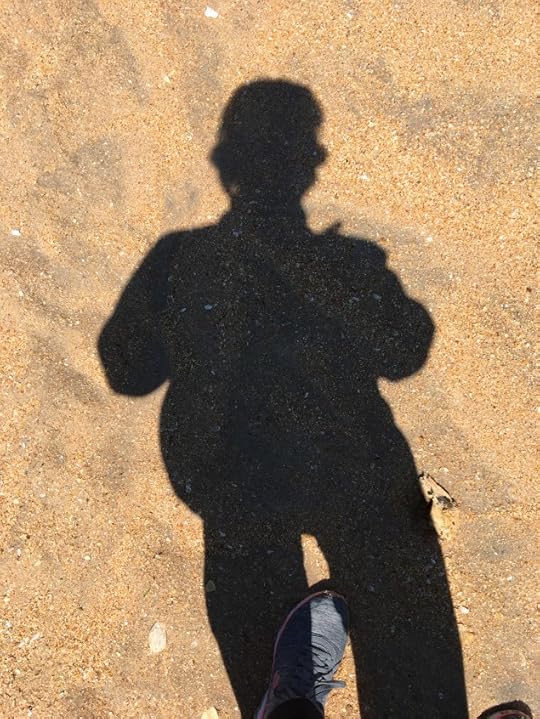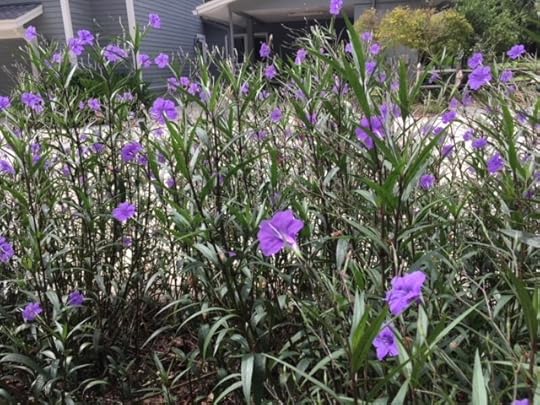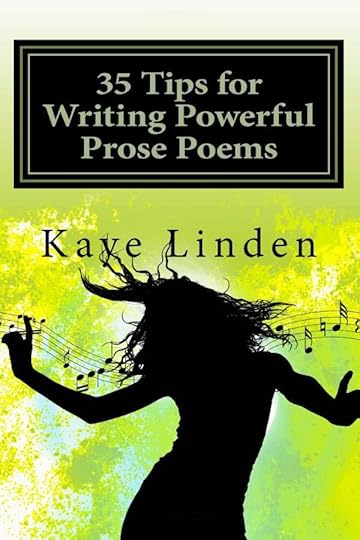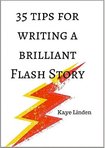Kaye Linden's Blog: http://www.singingformyfriends.com
February 26, 2019
Writing on the Head of a Pin
Next Contest: March 18 – May 17, 2019: $300 Prize and Honorable Mention in Fiction, Creative Nonfiction, Poetry, Prose Poetry, and Haiku (no submission fee this year).
Monday, February 25, 2019
Writing on the Head of a Pin
by Haiku & Prose Poetry Editor Kaye Linden
The language of haiku demands precision and restraint. Each word must count, each word must offer meaning. This tiny poem expresses a truth or viewpoint in layers of concrete detail and juxtaposed visual imagery, demanding skill and focus, and language control.
Haiku captures a moment when the mental chatter ceases and the heart “feels” a connection previously unseen. In just a few lines, haiku embodies the essence, the holiness of being alive–a flash of surprise, an interesting perspective. Such brevity demands skill and focus, like writing on the head of a pin. The reader is the yin of the yang in this form where the writer and reader meet half way. A reader might take away an intellectual concept from the haiku or “feel” the emotion of the poem like a light punch in the solar plexus.
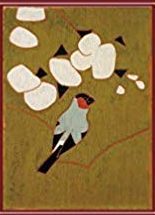 According to Higginson in The Haiku Handbook, haiku happens when we “see or sense something that gives us a bit of a lift, or a moment’s pure sadness. Perhaps it is . . . some scent on the wind . . .
According to Higginson in The Haiku Handbook, haiku happens when we “see or sense something that gives us a bit of a lift, or a moment’s pure sadness. Perhaps it is . . . some scent on the wind . . .
At midnight
A distant door
Pulled shut
and we find ourselves more alone, because of the being on the other side of that door.”
Perhaps you have heard of some of the greatest Japanese haiku masters. Basho, Issa and Buson were a few of the most well known. In 17th century Japan, poets often met in groups to compose a single long poem and together contributed two or three lines in an ongoing string of poetry, sometimes traveling throughout the country and adding to the linked poetry. This original linked haiku writing was known as Haikai no renga or haikai. In traditional style, the three-lined poem had a “kigo” or seasonal word, but today this is not necessarily the rule. The traditional criteria to include a seasonal theme has expanded to incorporate other themes such as human or animal themes or playful irony:
Years later–
she polishes the silver comb
with his toupee
Notice that haiku does not demand a title. It is a snapshot, and a title would suggest and distract the reader from an immediate response. The “image” of a haiku must capture the reader with specific concrete words such as “toupee” and “silver comb.” Instead of “anger,” which is a vague word to visualize, we “see” a disgruntled woman, possibly a widow, or an angry divorcee. This is the classic “showing not telling.” Can you see the irony in the juxtaposition of the use of the word “toupee” for a bald head, and the use of a rich man’s comb, a woman polishing with his hairpiece? How does she feel about this man?
When writing haiku, try to use words that might appeal to the senses, which can include touch, hearing, taste, smell, temperature, movement, pain, and any others you can think of. Therefore, when creating haiku, connect two images in unusual or surprising ways.
After the funeral–
even the mountains
are small
after the funeral–
a blood-red moon
Now write your haiku.
* * *
Submissions to Bacopa Literary Review 2019 will be open March 18 – May 17,
with a $300 prize and Honorable Mention in Fiction, Creative Nonfiction,
Prose Poetry, and Haiku (no submission fee this year).
Email ThisBlogThis!Share to TwitterShare to FacebookShare to Pinterest
Labels: Bacopa Literary Review, Basho, Buson, haiku, Higginson, Issa, Kaye Linden, The Haiku Handbook
No comments:
Post a Comment
Older Post Home
Subscribe to: Post Comments (Atom)
Bacopa Literary Review is an annual international print journal published by Writers Alliance of Gainesville.
Duotrope Interview: details about who we are and what we seek.
EDITORS:
Editor in Chief/Fiction Editor Mary Bast, poet/memoirist, artist.
Creative Nonfiction Editor Susie H. Baxter, prize-winning author, teacher of memoir.
Haiku/Prose Poetry Editor Kaye Linden, MFA, award winner in all genres.
Poetry Editor J.N. Fishhawk, poet, freelance writer/editor.
Click Image For 2018 Issue
">
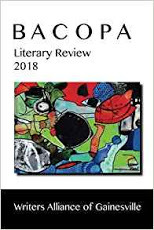
Connect on Social Media
FACEBOOK and TWITTER
Search This Blog
Follow by Email
October 23, 2018
A Brittle Peace a prose poem
Here’s Prasanga. He is one of two protagonists, one male and one female, in the sequel to the novel “Prasanga-the Wisdom Keepers.” It might take me a few years to write, but who cares? It’s on my list to complete before I die. Too many people have emailed me asking for the sequel. I’ve started the outline and am writing it backwards. Last scene gets worked first. Unless I know where I’m going I can’t make the journey. At least, not this particular journey. I might drown along the way, in the tunnels of the lava tubes, in the subterranean world.
In the meantime. The person who dislikes writing novels is writing one. How? Tiny segments. Minimalistic outline. Building and building on the essential. Hopefully, one of the keys to great writing.
Currently,
I am still tossing out a prose poem here and there. Catch this one about India. Of course. India’s in my blood.
from “Snaps and Musings of a Life Exposed”
a developing collection of tiny stories and poems of a life looking backwards and forwards
A Brittle Peace
Sweep. Sweep. Sweep. Sweep. Northern Punjab. Two a.m. – yawning of morning, rhythm of women sweeping: one sweep two sweep three sweep four. Metal pots crash on hard tile, bouncing bold atonal booms across the communal kitchen. Open windows witness drama of breakfast preparations, biting winter air, fog-filtered moonlight. Limbs lazy, I yank holy blankets over cold limbs, curl up, fetal, shivering, sweep away miscarried dreams, kiss dust balls goodbye. Sweep one sweep two sweep three sweep four… five a.m. Lumber out of bed, shut wood panels against chill winds, sweep sleepy eyes, meditate on possibilities.
Bathed in dawn light, the village flutters awake. Hushed whispers from the dining room twist into “F- you’s!” shrieked over clanking dishes, chinking pans, dropped plates shattering. Honied aromas, red jam dhosas, steaming white curried rice, buttered oatmeal, cinnamon chai, cardamom, cloves, burnt toast—
trails of humans hammering,
women sweeping–
India, I wept there once.
April 11, 2018
Musings While Walking on Cinnamon Beach, Florida
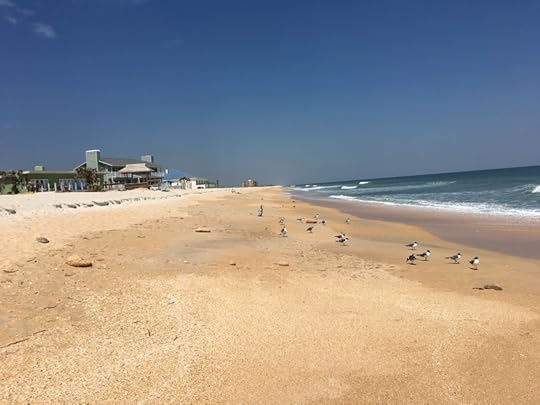 Musings While Walking on Cinnamon Beach
Musings While Walking on Cinnamon Beach
Ocean spray, new mown grass, fresh paint breezes between sunscreen, beer and yesterday’s un-showered sweat.
A few steps more, a bloodied rock, a closer look, is it red paint?
A pelican extends its slender gray neck, snatches a fish, turns its beak to the heavens and swallows deeply, neck quivering in spasms and gulps. The half-eaten fish, its tail visible and shivering. I zip up my jacket against the wind.
Another half mile down the beach, a dead pelican lies in hurricane ravaged dunes. Flattened feathers, legs askew, half-buried in whitewashed shell pieces, mortared and pestled by last week’s winds, hidden in shadows of late afternoon, amid other detritus washed up from sky to water to sand and land and back again. The pelican appears to resemble a weathered gray mass of driftwood, like one of those odd sculptures shaped by local hands. A seagull squawks and I jump, surprised by the piercing interruption.
I sit, lulled by inner whorls and swirls of hypnotic sea sounds. A burnt orange shell winks at me in sunlight, hinting of sea stories. Yesterday’s yin yoga chants through my body, drifting, shifting, searching for the scent of home displaced decades before across another ocean.
Sighing seas. Inspiration. You on the receiving end of my exhalation.
I almost trip over a thick twisted rope, knotted, weathered, torn, shredded, fibers like human hair. What strained against these ropes, now bright green with sea moss, and hot chili peppered by the salt spray’s saucing, slicing, dicing.
I wonder what lies beneath,
under the sand.
Perhaps, a pirate’s earring?
my feet my shadow sideways
February 28, 2018
Empty Nesting-the unfeathered nest
It’s a strange phenomenon, the empty nest syndrome. I didn’t see it coming. Our last child moved away. What was it about the last one? Perhaps, because the move is overseas, it hits that much harder. Perhaps not. Why don’t we hear more about what women experience with empty nest? I know men go through it too. I read about it online. I am grateful for the number of resources we have now at our fingertips. When I moved away from home, my mother had none of these resources available to her. We are a lucky generation.
Here’s the poem I wrote the day after “he” left. Oh, I know. It’s a little dramatic. Allow me the luxury of a few days of wallowing. It feels good.
The Defeathered Nest
This morning, the wooden swing collapsed.
I didn’t feel its shaky inner core, or acknowledge the old stories hidden by soft down pillows. The seat graced the underneath of an arbor decked in yellow honeysuckle, grounded by feathered ferns, purple passionflowers, doves roosting—a royal spot to savor black tea with cream.
I didn’t see it coming, didn’t see it.
I did hear the final crashing breath that ripped apart its history.
Surprised like an ice-skater skidding, unprepared for the rawness of a fall, slashed by icicles on proverbial walls, I didn’t see it coming.
The pillowed buffer, the seat, ensconced in pine needles, once shiny cedar, now in pieces, planks splintered across concrete by an explosive SLAM.
Just in time for his leaving.
The boy moved.
Ten thousand miles away. Another country. Another continent. To a land of dust, sand and tree plantings.
“Maybe I’ll return for Thanksgiving,” (“maybe not”) The boy moved. He’s not returning. I know it. I’m not going to feather that certainty.
I didn’t see it coming.
I cannot compete with Jerusalem, its mists, its hills, its fresh pita bread and steaming Turkish coffee.
The swinging seat, our favorite conversation spot. I tossed the vanilla biscuits and loose-leaf tea into the birdbath.
“All is well,” I say. “I’m doing this and that and that and this and bla, bla, bla, I bleat back to “you should do this, you should do that, you should, you should, you must not feel…”
A roaring wind rushes through the tops of white-blossomed dogwood trees.
I lie face-down in a concrete nest.
November 8, 2017
Almost Camping in Australia
Almost Camping in the Blue Mountains, New South Wales, Australia, many years ago:
My father insisted on getting out of the “big city” of Sydney each Sunday. One weekend, he drove my mother, my older sister and my ten year old self, on a car ride into the Blue Mountains and along Kangaroo Highway. This highway consisted of hundreds of hairpin bends and I remember it as the “vomit” highway. It twisted and backlashed ad nauseum. (forgive me)
We set up camp out in the bush. In those days, one could pitch camp anywhere. One of my most difficult adjustments on traveling in the USA was the concept of “private property.” (In Oregon, I woke up one morning to a rifle pointed at my head… but that’s another story.)
My father pitched our tent, hammering down stakes into dry soil, gathering supplies and reliving his Australian army days, his felt “digger”soldier’s hat crooked on his bald head. As dusky twilight descended over the blue fog of the mountains, he lit the campfire. Two Y-stakes held a long branch horizontally over a fire and on that branch hung the billy can. This rusty pot, the “billy can,” held water over the flames. Into the water my father tossed a handful of eucalyptus leaves, just picked from the prolific gum trees that exuded the classic blue tinge of Blue Mountain fog. This water boiled into gum leaf tea, sugared and sipped from tin mugs while we huddled around the dying embers of the campfire. The scent of boiling gum leaves and mountain air still hang in my memory, a smoky trail left behind…
That night, we slept in the tent, huddled inside sleeping bags, warm against the summer chill. During the night a sudden rain storm thundered down. The tent vibrated and swung in the onslaught. Awakened, half asleep and needing to pee, I climbed from my sleeping bag and felt my way through the front tent flap to the outside.
Soaking wet and blinded by the darkness and the downpour, I could not find my way back to the front opening of the tent. Scrambling around the edges of the tent, I lifted up one of the tent sides. My startled father shoved me down into the mud, shone a flashlight into my eyes and raised a thick stick over my head, ready to bash in my brains.
“What the hell are you doing?” he shouted over the rain. “I thought you were breaking into the tent.”
At that moment, the tent collapsed.
We spent the remainder of the dark hours shivering and shaking under the wet canvas.
“You never know,” my father repeated multiple times. “You never know who might be traipsing around out there in the middle of the night. You never know…”
Just as well he carried a big stick.
October 4, 2017
Flash Memoir Writing

Here is my mother, Helen. I visited her in Israel a month before she died. 92 and still had every tooth!
When my mother died a year ago, I was incapacitated with two broken arms and could not fly overseas to the funeral. I began to dictate flash memoir, a mix of prose poetry and flash story. By the time my hands could write again, I had collected bits and pieces of my story.
Helen’s amazing and historical story waits for sharing but I am not a lover of novel length writing. I have discovered the joy of writing memoir snippets and that will be how I share not only her story, but my Australian father’s story and eventually, my own extension of theirs.
I am still in the gathering process, finding snippets stuffed in an old shoe, another stuck inside a thesaurus or poetry text. It will take some time to find the gems and the not-so-gems. The culling process will be a brutal one after the gathering of the writings Gather first, rewrite next, send it through the intelligence of my on task critique group and rewrite again.
That’s a long, long process.
In the meantime, until I blog again in a month or two or three, here is one more piece I found for your perusal: a flash memoir possibly for the collection.
Thank you poet Jennifer Grant for your title suggestion: “Streaking through the Petunias”
Critiques, questions and comments are always welcome. Please let me know if you want to see further memoir snippets or not.
Hugs from Kaye

This is the car my mother drove in Australia. She held the dachshund on her lap when she picked me up sometimes from school. One time the dog jumped out of the car. My mother chased after her yelling “MITZI, come here now. I say NOW!” After that, I begged my mother to let me walk home from school.
Ragged
Today I scan my mother’s flat. A gold leaf, rustic tray, a china cup half-filled with tea, just a touch of cream, a matching plate decorated with tiny flying bluebirds, a slice of orange cake, half-eaten, ragged where her teeth left their imprint. The mahogany cabinet stares from a wall, a white Venus de Milo statue frozen, awaiting demise in a box: on the next shelf, a roman warrior, a Chinese vase fashioned with flecks of gold leaves on twisted brown vines, a small crystal bird with a broken wing—relics of a long life now useless in her new world. Toss out the vase, keep the bird, throw it out, keep it, keep something, keep it, toss it keep it toss it no keep that one
A few days before, she had breathed halting words down the phone—
“Why do I dream of white tunnels and stairs climbing into light?”
What hallways mother?
I knew then
I knew then
“Shadowed hallways, staircases jagged, steep, steep like a cliff face, steps carved into its side, steps with dark moss, but I can’t see the end, or where the steps lead, or who stands there, someone stands there, why, why the shadows, the terrible shadows, standing silent.”
I knew then
I knew then
Today, I turn to voices at the door of her flat.
Visitors, vulture beaks snapping
“It was such a shock.”
“She went so fast.”
“Your mother said I could have that painting.”
“She won’t be using those shoes anymore.”
“Don’t take her shoes,” I say. They carry her soul.
“She won’t need this red and black shawl.”
I grab the shawl from the hands of strangers. “She wears, no, I mean, she wore the shawl when she felt chilled, when the pain of separation grew too great, when her stomach ached, when my father didn’t return home, when her daughters stayed in America
the green clock with its grinding green hands ticks time.
Its sudden authoritative alarm s-c-r-e-a-m-s at me—SIX O’CLOCK — time for dinner, time to get dressed, time to measure out another evening in gefilte fish, challah bread, butter, jam, orange cake, tea, conversation alone.
I turn off my mother’s alarm for the last time.
October 2, 2017
Spoof me poem
Here are my purple Mexican Petunias after hurricane Irma slammed into Gainesville, Florida. They stand tall despite the ravaging.
I’m gathering and rewriting a collection of most of my published and unpublished pieces of flash memoir, flash stories, prose poems and a sprinkling of haiku.
I need help with the title:
Streaking through the World
Streaking through the Mall
Running through the World
Running through the Mall
Thanks for Not Cutting Down the Purple Petunias
Let me know your vote.
Here is a prose poem I started in an MFA at Lindenwood. I’m playing with it. Comments are welcome. I’d like to include it in my collection. Yes, the title is tricky but then, so is the poem.
Welcome to disorientation. Just feel it without overthinking. Memoir zapped.
Spoof Me
Don’t talk to me about man and his love of water. Water sucks down and away and man sucks any which way.
Don’t talk to me about women who walk on water or men who think they do. They all go under.
Don’t talk to me about sobs in the next room. The waterworks of a human running.
Don’t talk to me about twilight and its power to kill. I grow in silence.
Don’t talk to me about floodwater flashing over Ute graves in Durango, where fifty feet under lie villages of sorrowful maidens raped and rejected a millennia ago, their love knots melted into silt. We will never solve their love triangles.
Don’t talk to me about white men who once sailed the globe. Strip them of their money, their skin and who are they? White men without skin. Not much to look at.
Don’t talk to me about salvation. I have no idea what that is and besides, I walked on water three times and it wasn’t much fun.
Don’t talk to me about ice cream dribbling down a cake cone in outback heat, dog growling out of the shop, biting into my child leg as vanilla scoops tumbled to mud.
At least the dog ate them.
A purple bruise grows on my remembering.
July 12, 2017
The day my tooth fell out in India…
The week before I left for India, I asked the Dentist to check my crowns. “I don’t want a problem in the middle of India!”
Of course, that’s exactly what happened. The crown fell out in the middle of India.
Two weeks into my stay on the ashram, (the cleanest place I have ever seen on the planet) I bit into a jujube (a sticky candy) at afternoon tea time. That pulled a crown right out of my mouth. I’m sure you all know that sinking feeling … the ugly realization spiraling up from within, the demon that laughs: “So, you think you are in control. Ha!”
The circular route to the dentist occurred thus: wait at doctor’s office for one hour. Show gap in mouth. “Yes. I have the tooth.” Show tooth stuck in sticky candy. Walk a mile to the local hospital in 85 degree heat. Check with paper pushers on the main floor of the immaculately clean hospital. Check with another paper pusher who signs the OK to see “THE DENTIST” Walk up spiral staircase through a hospital dormitory with ten beds. Wait in line with fifteen others to see “THE DENTIST”
A little old lady with a cane tried to push in front of me. “NO” I said. If she pushed in front, everyone would push in front of me. I have a lot of experience traveling the middle and far east. I know better than to let a little old lady get in my way. (Shame on me, really.) I waved her to the back of the line and nobody tried to get at the head of the line again. A few minutes later, a lady in an orange sari beckoned me inside to the clinic, ahead of everyone else. Eyes stared at me, past me, over me. Guilt plastered my face. Indian hospitality mandates courtesy to the visitor.
Once in the dentist’s chair, a resident checked out my mouth. “Mmmmm” “Aaahhhhh.” Twenty minutes passed until the head guy strolled in. I knew right away that he was “THE DENTIST”
What a guy! Handsome, confident, a navy turban on his head, deep, black intelligent eyes and I was in love. He moved the air as he walked by. Each person stepped back and bowed, just a little, when he passed. The man from Ipanema (“When he walks he’s like a samba, That swings so cool and sways so gentle, That when he passes, each one he passes, Goes “aaah”)
“Yes, Doctor. Yes, Doctor.”
I opened my mouth and he began…
to drill…
A silent scream raced through my veins until I grabbed his hand and stopped the drilling.
“Don’t you have anything for pain?”
“I do,” he says. “But I am not using it. It’s over so soon.”
“Americans are not like the Indians. I used to suck up the pain when I was younger but can’t do it anymore. Please doctor. Some lidocaine gel.”
“Open your mouth. Just put your hands up if you can’t take it.”
“My hands are up NOW!” I shouted. “NOW. My hands are up. Do you see?”
The nurses and residents snickered. Some laughed openly. My palms sweat drips and drops. My face flushed.
Embarrassment opened my mouth for more drilling.
“There,” he said. “You see. We’re done now. Not so bad, was it.” He patted me on the shoulder. “NEXT PATIENT!”
“Thank you, Doctor.”
I nursed a bruised ego and a bad reputation for Americans. I had acted like a softie.
I trembled to an office window to pay.
“No charge. Our services are free to all. Our pleasure, madam.”
I have to say. He did a great job. The crown is still in there but my face still feels red. Thanks Doc.

Can we go home now?
acknowledgement to Frank Sinatra for that fabulous song: “The girl or boy or man or such from Ipanema.”
June 7, 2017
35 Tips for Writing Powerful Prose Poems
It’s finally here. I have included a chapter for your interest.
best from Kaye
Table of contents:
Introduction
Chapters:
The prose poem
Starting a prose poem
The first few lines
How long should it be?
Write about life
Other ways to paint pictures with words
The creative process (drafting two poems)
Drafting and Crafting
Prompts and more prompts
Who is your audience?
Not enough information
Too much information
Naming your poems
Point of view
To use punctuation or not?
Unity
Using tenses
Make the poem active and alive
Descriptive words
An easy fix
Ending the poem/the last few lines
Examples of prose poems
Are prose poems stories?
Dialogue in prose poetry
Writing two more drafts
Language
Minimalism and Compression
Types of prose poems
Ways to write fresh poems
More tips
Mastering the prose poem
C.O.A.P.
How do I know whether my poem is good?
Workshop groups
Lots more tips
Conclusion
Resource List
About the author
Introduction
This book addresses the beginning, intermediate or advanced writer of any age or grade level who desires to understand and write prose poetry. I hope that the interested writer will learn to love writing and exploring this liberating genre.
As poetry editor for The Bacopa Literary Review, I have edited over a thousand poetry submissions and read many prose poems that required only minor revisions or a little guidance to become publishable. Most of the insights in this book apply to great writing in general. I have focused the text on prose poems, popular with writers because of their unlimited potential for playful creativity. I invite you to accompany me through each chapter and prompt, to understand the spirit of this intriguing form. If you follow the step-by-step process of learning, you will have written several prose poems of your own by the end of the book.
This is the second reference book in the 35 Tips series. These little books include only the essence, the facts, the bottom line. This textbook focuses on two essential qualities of great prose poetry: brevity and specifics.
Learning objectives
The writer will:
learn to recognize a prose poem
learn to understand prose poems
learn the best techniques for writing a prose poem
draft several prose poems from prompts
revise and polish these prose poems
practice the craft of writing prose poems
use the resource list for further exploration of prose poetry
Chapter One
The prose poem
If you love eccentric, beautiful things, you will enjoy prose poetry.
Here are tips about prose poetry:
Prose poetry speaks about the truth of the world as the poet sees it.
Poetry should be clear, understandable and make sense. Otherwise, poems are just words splashed on paper.
Writers of prose poems do not usually use the rhymes, rhythms and line breaks of traditional
In prose poetry, each word chosen is important.
Prose poetry skillfully uses language that inspires the reader.
Prose poets hope to amaze and delight.
Prose poetry might suggest its meaning with poetic language such as metaphors or similes.
Writers of prose poems concentrate on scenes, description and surprise.
Prose poetry can have a story line, but does not need a story line.
Prose poetry has a center of gravity the way the earth has a molten core.
Prose poets aim to arouse an emotional response in the reader.
Prose poetry can consist of two lines, or a few paragraphs, or longer.
Prose poetry includes full sentences.
Prose poetry has a narrative shape on the page: a sentence, a few sentences, a paragraph. That’s one reason it is called prose poetry, because it is written in the shape of
Writers should read their prose poems aloud because this is the best way to hear mistakes, catch skips in rhythm or meaning, inconsistencies, check the pacing and tense, or identify shifts in point of view.
Here is the first stanza from the prose poem “Big Bang” by Leslie Anne Mcilroy, published in The Bacopa Literary Review 2016:
Date with Syzygy
More than once, the sun and the moon doing things they’ve never, trading light for dark, all eclipse and aerial acrobatics. The stars, blinking with confusion, bumping into clouds in broad daylight, dawn and dusk dancing in drag, roosters crowing at twilight, and me, here at the window, waiting for a universe.
Prose poems and the beginning prose poem writer
A prose poem format offers the beginning writer a fantastic trampoline to bounce around creativity. A prose poem can be about any subject. The following chapters will help you write without rambling, choosing words and images that will move your readers. Many a beginning poet has broken through their self-doubt via this pathway. It is a lot of fun, but stick to the tips and suggestions until you have read and written lots of poems.
Don’t bend the rules until you know them.
At the end of the book is a list of resources to inspire the beginner and excite the seasoned writer.
March 22, 2017
The Bacopa Literary Review Editor’s Blog: flash is no longer fiction…
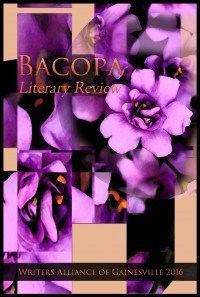
Bacopa Literary Review
Writers Alliance of Gainesville’s international journal in 8th year : Contest Submissions Open April 1, 2017 This blog cited among Top Literary Blogs for Writers and Publishing Agents.
For examples of work we seek–follow, connect, read below, or click: flash story, poetry, fiction, nonfiction.
Sunday, March 19, 2017
Flash is No Longer Fiction. . .
By Flash Story Editor Kaye Linden Bacopa Literary Review 2017 submissions will open on April 1 and include “flash story,” which can include creative nonfiction, memoir, fiction genres or a combination of these genres in 750 words or less, including micro-flash which might consist of 250 words or even fewer.
Here are a few of the criteria I look for in a flash story submission (see also 35 Tips for Writing a Brilliant Flash Story).
Creative nonfiction, memoir, fiction, or a combination of these genres
Tiny plot or character driven
Compression: almost every word counts or carries meaning
A minimum of adverbs
Focus on one scene or event
A minimum of dialogue
A great title
Consistency of tense and point of view
Fresh expressions without the use of clichés
Riveting language or language that moves the reader
Originality
Story structure: a purpose, a beginning, middle and end with conflict, conflict, conflict and resolution.
Here’s an example of my own 376-word flash story, written in response to the newspaper article cited below:
The Future Legend of How Rising Seas Drowned Saint Augustine and its Famous Statue*
The first grain of sand to go slipped unnoticed into muddy seawater and high tide washed a small chunk from the base of Ponce de Leon’s statue. Three teenage boys waded to the town plaza, climbed to the top of Ponce’s helmeted head and practiced kissing his cold lips, slapping his face when Ponce didn’t kiss back, and hanging upside down from the old head that bowed in shame at the youthful play. Perhaps Ponce felt jealous of young muscles and flexible limbs, or of the strength to climb statues and throw popcorn and peanuts from his slumped unyoung shoulders. He never did find the fountain, and with the Atlantic tide rising, rising, rising, his steel boots sucked down further, awash in brine. The boys knew, and Ponce knew, he was going under. Each evening the boys chopped off a finger, a thumb, a toe and the middle finger of the right hand became a tool to gouge out an eye, graffiti the shiny armor with she loves me, she loves me not, and scratch mud daubers and wasps from Ponce’s ears. They removed one earlobe with the sawing up and down, down and up motion of a hacksaw, laughing at the crumbling little man as he lost one appendage at a time. The boys removed the mighty sword from the gallant gentleman and topped his head with the blade in a decapitation celebration, the step-by-step ritual of taking a great warrior down. Water washed over Ponce’s knees while grains of stone fell away from the foundation in greater and greater chunks until Ponce leaned upside down, headless shoulders standing in water. One night, the boys stretched out drunk, across the rubble, across the broken fingers and toes, across the scraps of Ponce’s heroic eyes, those eyes that once upon a time surveyed the fertile flowering of La Florida where surely his immortality lay. The water rose and rose and rose during the hurricane of 2019, a category six travesty, off the grid, never before witnessed, never before seen by the boys who drowned that night, never before seen by the city of Saint Augustine that drowned that night, never before seen by Ponce de Leon, whose hopes for a bright future drowned in rising seas.
*The Gainesville Sun, Florida, May 10, 2015: “Sea rise threatens Florida coast but no statewide plan”
See also: “How Can a Mother?”
Other Resources:
Micro Fiction: An Anthology of Fifty Really Short Stories , edited by Jerome Stern. New York, N.Y.: W.W. Norton & Co., 1996. Print.
The Rose Metal Press Field Guide to Writing Flash Fiction: Tips from Editors, Teachers, and Writers in the Field . Masih, Tara L. Brookline, MA: Rose Metal, 2009. Print.
The Rose Metal Press Field Guide to Writing Flash Nonfiction: Advice and Essential Exercises from Respected Writers, Editors, and Teachers . Moore, Dinty W. Brookline, MA: Rose Metal, 2012. Print.
As this form can flash short and with impact, I refer readers to “Six One-Sentence Stories” by Bruce Holland Rogers.
Bacopa Literary Review contest submissions open April 1 – May 31, 2017
Posted by Mary Bast at 8:55 AM No comments:
Email This BlogThis! Share to Twitter Share to Facebook Share to Pinterest
Labels: 35 Tips for Writing a Brilliant Flash Story, Bacopa Literary Review, flash, flash fiction, flash memoir, flash stories, Kaye Linden
http://www.singingformyfriends.com
A celebration of "Tales from Ma's Watering Hole" a linked flash collection of magic realism.
"Ma is a character we can all relate to and at the same time wish we had her magic. She teaches respect for the earth and all its creatures, but she doesn't preach. Ma has a sense of humor and guides us through the outback with tales that cast a spell, all mysteriously connected yet each with its unique story." Mary Bast author/consultant
Add it to your shelf:
https://www.goodreads.com/book/show/1... ...more
- Kaye Linden's profile
- 40 followers





